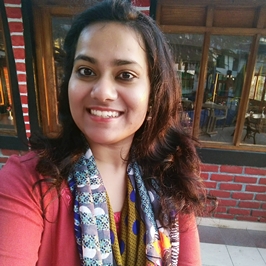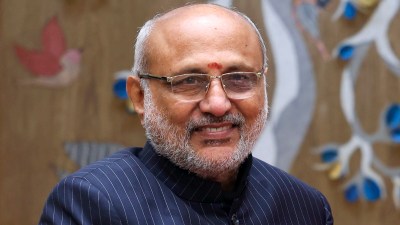Nearly 700 young Buddhist nuns in a Nepal monastery, situated in the Himalayan region, are learning and training other young girls in Kung Fu, a form of martial art popularised by Bruce Lee. While the objective is self-defence, these spunky ‘Kung Fu nuns’ are in the process challenging ancient Buddhist traditions that barred them from venturing into such territory. And they haven’t stopped at just Kung Fu.
“Many people assume that nuns are only good for meditation and chores. While meditation is important, there is so much else that we can achieve. We can install solar panels, do gardening and administrative work, cook, ride bicycles, besides creating awareness about human trafficking. On top of all that, we are experts in Kung Fu,” remarks Jigme Migyur Palmo from Ladakh, a ‘Kung Fu’ nun who belongs to the Drukpa lineage, a 1000-year-old Buddhist tradition that began in the Himalayas.


Jigme Migyur Palmo has been a Kung Fu nun since 2005.
Story continues below this ad
From as young as seven to aged 35 years, females from any part of the country, or the world, are welcomed to join the group.
Recalls 26-year-old Jigme Rupa Lhamo from Himachal Pradesh’s Lahaul Spiti, “I was all of 13 when His Holiness Gyalwang Drukpa, the founder of Drupka lineage visited my town. I was so inspired by him and how Kung Fu can combine spirituality with real action and impact. I confided in my family about my wish to become a nun; they were initially sceptical, since I am a single child, but came around after I persuaded them that I could really break barriers.”
To challenge gender roles in conservative cultures, the Gyalwang Drukpa encouraged nuns to learn skills traditionally reserved for men, such as plumbing, electrical fitting, driving, and cycling. He also positioned nuns in leadership roles at Drukpa monasteries.
For Lhamo, 26, who has been a Kung Fu nun for 13 years now and travelled the globe for self-defence training sessions and Kung Fu performances, it is the “confidence” that she gained from the martial art that she wishes to pass on to others of her gender.
Story continues below this ad
Interestingly, the prefix ‘Jigme’ that’s common to their names, means fearless in Tibetan.
 Kung Fu nuns are spread across the Himalayan range of Asia.
Kung Fu nuns are spread across the Himalayan range of Asia.
A typical day in the life of a Kung Fu nun starts at 3 am with meditation and prayers till 6 am. The self-defence session is followed by breakfast that often comprises bread and eggs. Then, they study until lunch that they prepare themselves on a rotational basis. Their day ends with another round of Kung Fu and prayers in the evening.
“We rotate most chores among ourselves, which are beyond our regular classes and spiritual practices. So our days are always packed. Some of our other activities include animal rescue, music, dance and theatre. We do our own choreography and, at times, even compose our own music,” shares Jigme Osel Dipam from Kinnaur.
 27-year-old Jigme Tontam Wangmo has been a Kung Fu nun for 14 years.
27-year-old Jigme Tontam Wangmo has been a Kung Fu nun for 14 years.
On some days, the nuns undertake ‘Eco-Pad Yatras’, usually over 400 miles on foot to pick up plastic litter and other waste, while educating locals on environment-friendly ways of living.
Story continues below this ad
Recently, they also undertook ‘Bicycle Yatras’ across all of India and Nepal to promote world peace and green transportation. “These events take several months at a time to complete, often battling rain, snow, wind, avalanches,” remarks 27-year-old Jigme Tontam Wangmo.
 Jigme Rupa Lhamo from Himachal Pradesh’s Lahaul Spiti practices with children.
Jigme Rupa Lhamo from Himachal Pradesh’s Lahaul Spiti practices with children.
In 2015, when Nepal was struck by a devastating earthquake, with support from international non-profit Live to Love, the nuns were among the first relief workers, distributing aid on foot to villages. Later, they also carried out rescue operations through medical helicopters and trucks. This year, they helped build nearly 200 homes for families of earthquake victims.
Their efforts have been recognised at the Asia Society’s Gamechanger Awards in New York, United States of America whose list of previous awardees include former CEO of PepsiCo Indra Nooyi (2018), late architect IM Pei (2016) and Nobel laureate Malala Yousafzai (2014), for the transformative impact they are making in Asia. They believe this could be a turning point in their journey.
“People assume there is a monk presiding over nuns. But Drukpa Kung Fu nuns are independent. We are really happy and excited about this recognition and hope this will help further our efforts,” commented Palmo.
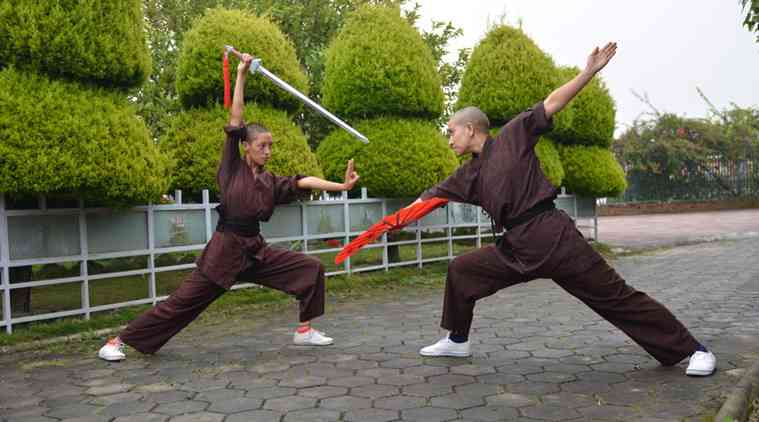 The Drukpa Kung Fu nuns are the only Buddhist nuns in the world to practice Kung Fu.
The Drukpa Kung Fu nuns are the only Buddhist nuns in the world to practice Kung Fu.
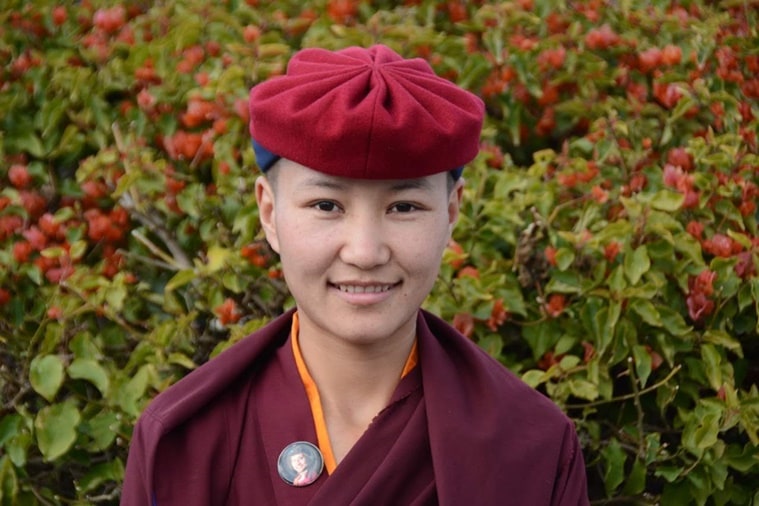
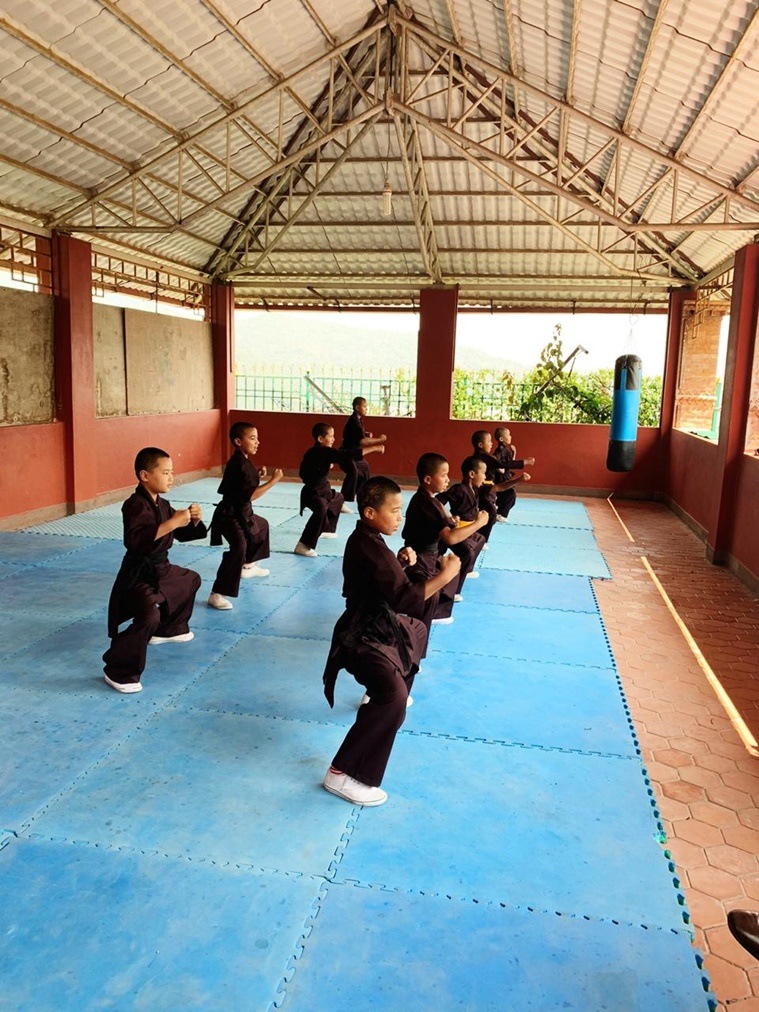 Kung Fu nuns are spread across the Himalayan range of Asia.
Kung Fu nuns are spread across the Himalayan range of Asia. 27-year-old Jigme Tontam Wangmo has been a Kung Fu nun for 14 years.
27-year-old Jigme Tontam Wangmo has been a Kung Fu nun for 14 years.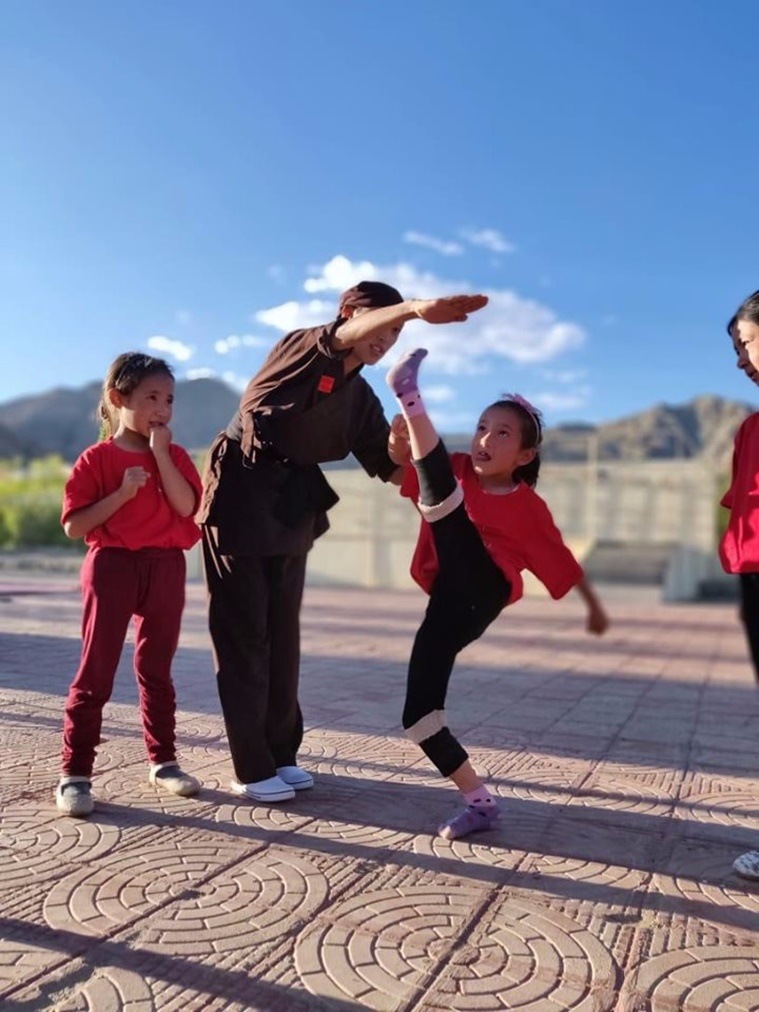 Jigme Rupa Lhamo from Himachal Pradesh’s Lahaul Spiti practices with children.
Jigme Rupa Lhamo from Himachal Pradesh’s Lahaul Spiti practices with children.